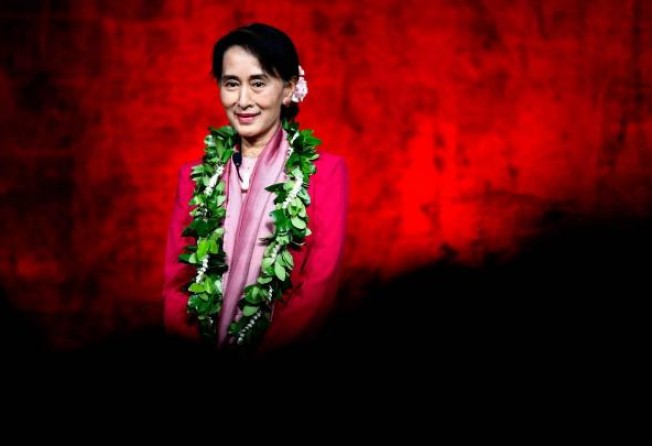US, China have roles to play in Myanmar, says Suu Kyi

The United States, which is working to increase its influence in Asia, should not be considered a challenge to Myanmar's long relationship with China, according to democracy icon Aung San Suu Kyi.
She said it would also be presumptuous to think that Beijing should learn something from Myanmar's democratic reform, though the two countries appeared to share one thing in common: corruption.
Speaking to the South China Morning Post in a small group interview on the sidelines of the Rotary Global Peace Forum in Honolulu yesterday, Suu Kyi said China's political direction should ultimately be decided by the Chinese people.
When asked by the Post for her comments on Myanmar's growing ties with the US, Suu Kyi said: "I don't think it needs to be an exclusive relationship. It doesn't mean we have to be friends either with the US or China. We need to be friends of both.
"China is a neighbour and the US is a very, very powerful nation that is eager to help with emerging democracy."
Suu Kyi, who was awarded the Nobel Peace Prize in 1991, spent 15 years under house arrest when the country was ruled by a junta. She was freed in November 2010 and is now a member of parliament pressing for domestic change, as well as the lifting of international sanctions.
Since then, the US has worked hard and fast to improve its ties with the new government, with removal of its sanction on Myanmar and many visits by private and official delegations. President Barack Obama made a landmark visit in November last year.
The visit was part of a shift - the so-called Asia pivot - by which Washington aims to advance diplomatic and economic relations in the region, in part to counter China's rising influence.
"We have always had a very good relationship with China from the very beginning of the Communist government there. At that time, Burma was practising democracy, not a perfect system, but working towards democracy. But even then we maintained very good relations with our neighbours, including China," said Suu Kyi, whose father was a top military leader who tried to seek independence for Myanmar peacefully and was assassinated by his rivals.
Suu Kyi noted that for Myanmese people, freedom of thought and speech should be as important as basic needs for daily life such as food, roads and hospitals. But she said corruption remained a major problem in the country since the junta officially disbanded itself in 2011 and handed over power to a so-called civilian government headed by President Thein Sein.
"Freedom of thought in many ways is a habit. You must learn to ask [the government] questions and ask why. If you want to change things, you must get to the root of the trouble," said Suu Kyi.
When asked for her expectations on the prospects of political reforms in China since its once-in-a-decade leadership transition, she replied: "I don't think Burma alone will be able to bring changes to a big and ancient country like China.
"It's the people of China themselves who will decide in which direction they want the country to go … We are just starting our road to democracy and we haven't even got there yet. We can't start thinking about how to help other people to achieve democracy before we achieve it for ourselves."
Suu Kyi said she had discussed the problem of corruption in Myanmar recently with many high-level officials - the same problem increasingly concerns Beijing since new Communist leader Xi Jinping took power in November.
"Many of them [Myanmese officials] say, well, if you can prove somebody is corrupt or has engaged in corrupt practices, you can provide evidence so we shall sack them.
"I said it is not just about sacking people who are corrupt. We have to find out why so many of our civil servants are corrupt and try to correct the situation.
"Actually, if we sacked all our civil servants who are corrupt, we would have just few officials [left]," she said.